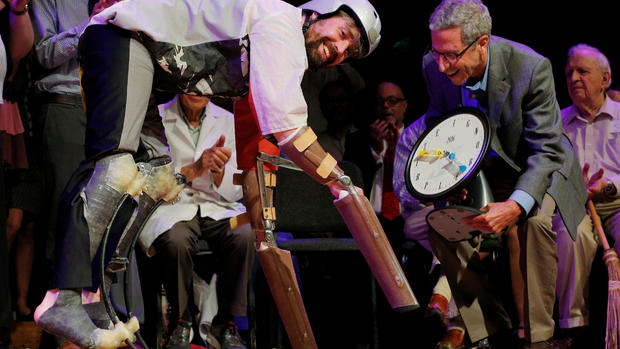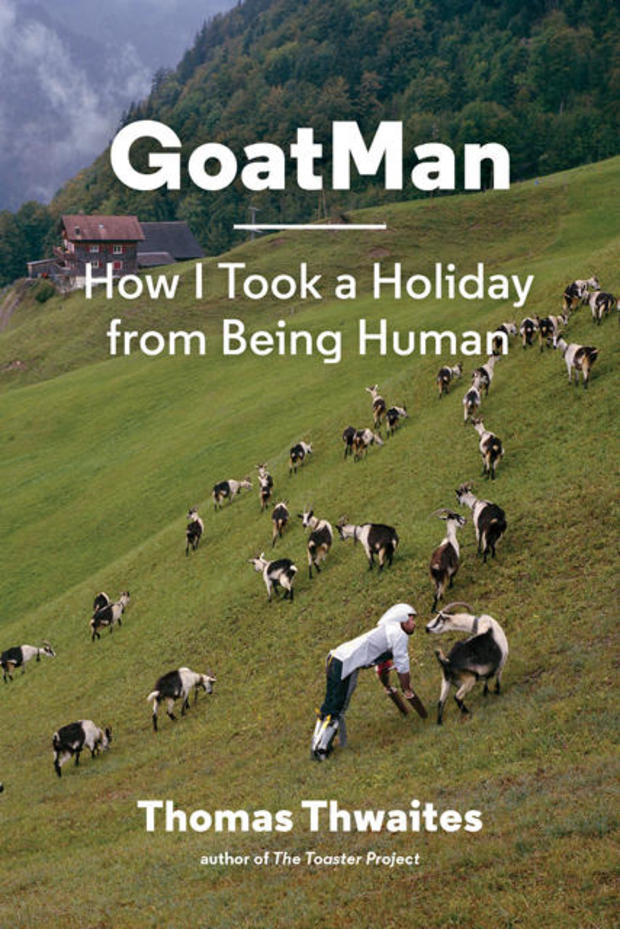Meet the zany winners of the spoof Ig Nobel Prizes
BOSTON A Swede who wrote a trilogy about collecting bugs, an Egyptian doctor who put pants on rats to study their sex lives and a British researcher who lived like an animal have been named winners of the Ig Nobels, the annual spoof prizes for quirky scientific achievement.
The winners were honored – or should we say dishonored? – in a zany ceremony Thursday night at Harvard University.
The 26th annual event featured a paper airplane air raid and a tic-tac-toe contest with a brain surgeon, a rocket scientist and four real Nobel laureates.
Winners receive $10 trillion cash prizes – paid in virtually worthless Zimbabwean currency.
The awards are sponsored by the humor magazine Annals of Improbable Research. The organization generally gives winners the opportunity to quietly decline the “honor” – but most people offered Ig Nobels do accept the award and attend the ceremony, Improbable Research said. The awards are handed out onstage by bemused real-life Nobel laureates.
This year’s Ig Nobels included research by Fredrik Sjoberg, who published three volumes about collecting hoverflies on the sparsely populated Swedish island where he lives.
It sounds downright dull, but Sjoberg’s books are a hit in his homeland, and the first volume’s English translation, “The Fly Trap,” has earned rave reviews.
“I had written books for 15 years (read by no one) when I finally understood it’s a good thing to write about something you really know, no matter what that might be,” Sjoberg said in an email, describing the award as the pinnacle of his career.
“The Ig Nobel Prize beats everything,” he said. “At last I hope to become a rock star. Leather pants, dark sunglasses, groupies. All that.”
Another animal-inspired prize winner was Thomas Thwaites of the U.K.
Thwaites created specially designed prosthetic limbs that allowed him to walk on all fours so he could more closely experience life among a herd of goats on a mountainside in Switzerland.
“I tried to become a goat to escape the angst inherent in being a human. The project became an exploration of how close modern technology can take us to fulfilling an ancient human dream: to take on characteristics from other animals,” he explains on his website.
Thwaites wrote a book about the experience entitled “GoatMan: How I Took a Holiday from Being Human” and was awarded an Ig Nobel in Biology for his troubles.
Charles Foster, a fellow at the University of Oxford in the United Kingdom, also won in the Biology category for literally living like an animal. He spent months mimicking a badger, an otter, a fox, a deer and a bird in an attempt to see the world through their eyes, then wrote a book, “Being a Beast,” about his experiences.
He lived as a badger in a hole in a Welsh hillside; rummaged like a fox through trash cans in London’s East End looking for scraps of chicken tikka masala and pepperoni pizza; and was tracked by bloodhounds through the Scottish countryside to learn what it’s like to be a deer.
It wasn’t much fun.
“I was hunted down quite quickly,” he said.
Ahmed Shafik, another honoree, decided rats needed pants.
He dressed his rodents in polyester, cotton, wool and polyester-cotton blend pants to determine the different textiles’ effects on sex drive. The professor at Cairo University in Egypt, who died in 2007, found that rats that wore polyester or polyester blend pants displayed less sexual activity, perhaps because of the electrostatic charges created by polyester. He suggested that the results could be applied to humans.
The study did not explain how he measured a rat’s waist and inseam.
Andreas Sprenger was part of a team at the University of Luebeck in Germany that found that if you have an itch on one arm, you can relieve it by looking in a mirror and scratching the opposite arm. Sound silly? But imagine, Sprenger said via email, if you have a skin condition with an intolerable itch, you can scratch the other arm to relieve it without rubbing the affected arm raw.
Gordon Logan, a professor of psychology at Vanderbilt University, and colleagues from Canada and Europe won for their research on lying. Their study of more than 1,000 people who are ages 6 to 77 - “From junior to senior Pinocchio: A cross-sectional lifespan investigation of deception” - found that young adults are the best liars.
How do the scientists know their subjects weren’t lying to them?
“We don’t,” Logan said.
The absurdist ceremony has a higher purpose, organizers said.
“We are honoring achievements that make people laugh, then think,” Improbable Research explained on its website. “Good achievements can also be odd, funny, and even absurd; So can bad achievements. A lot of good science gets attacked because of its absurdity. A lot of bad science gets revered despite its absurdity.”


